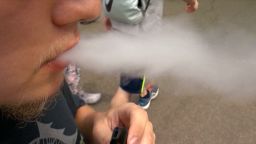An independent panel of experts says its review of the US Food and Drug Administration’s tobacco program found numerous wide-ranging problems that hinder its ability to regulate the industry and reduce tobacco-related disease and death.
FDA Commissioner Dr. Robert Califf requested the review in July, anticipating the complex issues that will come with an ever-growing number of tobacco products. The experts were asked to take a closer look at the agency’s regulatory process and agency operations, as well as how it handles application reviews, compliance and enforcement actions, and communication with stakeholders and the public. The panel did not review the FDA’s tobacco policy itself.
In the wake of the baby formula crisis, Califf also asked for a review of the way the FDA managed its efforts to keep the US food supply safe, and the resulting report was highly critical.
Monday’s new report from a separate panel assembled by the Reagan-Udall Foundation says the Center for Tobacco Products’ efforts have “had a measurable impact,” but the already-difficult work of regulating a large industry is made even harder by a huge volume of product applications, repeated changes in leadership and near-constant litigation.
Although the center “has a critical mission to protect the public health from tobacco-related disease and death and is regulating products that have no inherent benefit and huge societal costs, it is a government regulatory program with a duty to run efficiently, fairly, and transparently,” the report says. Instead, it “has been forced to operate primarily in a reactive mode, moving from one challenge to the next.”
The panel found a lack of clarity, even about the center’s goals and priorities, as well as deficiencies in transparency and communication. There were also concerns about the need for input from stakeholders and the public, as well as about policy shifts that seemed to happen without notice and were inconsistently implemented.
Massive workload
The FDA was given the authority to regulate the marketing, manufacturing and distribution of tobacco products in 2009 when Congress passed the Tobacco Control Act. Manufacturers were required to submit an application to the agency and receive marketing authorization before selling any new tobacco products.
The aim was to give a government agency the ability to create regulations that would protect Americans’ health, but critics say it was a fundamentally flawed task because these products are detrimental to health.
The Center for Tobacco Products has also faced criticism from anti-tobacco advocates who say the agency has been too slow to act and has blown court-ordered deadlines to regulate e-cigarettes.
This month, the US Department of Health and Human Services’ Office of Inspector General issued a report criticizing the FDA for its lack of oversight of online tobacco retailers, saying that children’s use of tobacco remains of “high concern” and that online sales are a potentially easy way for kids to buy products without having to verify their ages.
In 2022, nearly 17% of high school students – or more than 2.14 million high schoolers – reported that they currently used e-cigarettes, according to the US Centers for Disease Control and Prevention. And 1 out of every 30 middle school students, about 3.3%, said that they used an e-cigarette in the past 30 days. For high schoolers it was 1 of every 7 students, the CDC said. For cigarettes, in 2022 1 out of every 100 middle school students smoked a cigarette in the last 30 days, it was 2 out of 100 high schoolers, according to the CDC.
Public health experts are concerned about youth use of tobacco products because it can become a lifetime habit. Nearly 9 out of 10 adults who smoke cigarettes daily first try smoking by age 18.
In the years since its inception, the workload of the Center for Tobacco Products has become “nearly overwhelming,” the new report says: It received 432 premarket applications for tobacco products through October 31, 2019, but more than 8 million in fiscal year 2020 alone. This massive number of application reviews has left staff members fatigued; the tobacco industry and public health advocates are in turn frustrated, turning to litigation to address their concerns.
“Stakeholders observed that the current application review process is extremely cumbersome and time-consuming, characterizing the submission requirements as vague and frequently changing,” the report says. And with a huge backlog of applications, “The current environment reflects an unintended shift from what was structured by law as a pre-market authorization framework to the reality of a post-market regulatory environment.”
That environment carries its own challenges. Some manufacturers continue to sell products even without marketing approval because of a lack of FDA action, even “submitting deficient applications or filing frivolous appeals to further delay enforcement action.” But the enforcement process is lengthy and cumbersome, and the ultimate decision on whether to take punitive action against a company rests not with the FDA but with the US Department of Justice.
Room for improvement
The review panel recommended four major areas of improvement and offered recommendations “intended to help the Center develop additional tools for achieving its public health objectives,” panel Chairperson Lauren Silvis said in a statement.
First and foremost, the report says, the Center for Tobacco Products should become more proactive and strategic, thinking about where it stands and where it needs to go. “CTP must invest the time, now, with staff and public input, to create and implement a Strategic Plan that identifies the Center’s strategic objectives and plots an operational roadmap of the steps CTP will take over the next five years to achieve those objectives.”
The panel also suggests improving transparency and communication, clarifying expectations for the industry and soliciting public input on topics like its education campaigns.
The center should improve the application review process, the report says, developing “a more clear and predictable framework” and clearly identifying application requirements and expectations.
The panel also suggests working with other agencies on enforcement. “FDA cannot change the current tobacco enforcement paradigm on its own. If enforcement of tobacco laws is considered a priority for the Agency and the Administration, particularly given the disproportionate public health impact of illegally marketed tobacco products on youth, significant resources must be devoted to establishing enforcement processes that are more effective in clearing the market of illegal products.”
An interagency task force including the FDA, DOJ, the US Department of Health and Human Services and the Department of the Treasury could streamline the enforcement process and increase the consequences for violations, the report says. The FDA could also consider independent approaches that don’t require DOJ assistance, including “high-profile actions against wholesalers and distributors.”
Next steps
Health officials will review the report over the next several weeks, Califf said in a statement Monday, and will have an update on next steps by early February.
“We’ve made important progress and reached science-based regulatory decisions across a broad array of products in the 13 years since Congress tasked the FDA with regulating tobacco products,” he said. “Even greater challenges and opportunities lie ahead as we determine how the agency will navigate complex policy issues and determine enforcement activities for an increasing number of novel products that could potentially have significant impact on public health.”
The Center for Tobacco Products is “a new center with a different kind of mandate,” noted Erika Sward, assistant vice president of national advocacy for the American Lung Association. “Having a strategic focus and getting ahead of the curve, and seeing that this cannot just be the responsibility of one center at FDA but really needs to be the entire government collaborating to reduce the leading cause of preventable death in the United States, is a really important reminder.”
Manufacturers that market products illegally “will eventually think twice about selling their products in the US” if they see law enforcement agencies like the Department of Justice cracking down on other companies, she said, “but we’re not at that tipping point yet. And we need a whole lot more follow-through when it comes to enforcement of the law.”
Get CNN Health's weekly newsletter
Sign up here to get The Results Are In with Dr. Sanjay Gupta every Tuesday from the CNN Health team.
However, “we want FDA first and foremost to be a public health agency, and we want the Center for Tobacco Products to be looking to protect the public health,” Sward said. “It is not FDA’s responsibility or obligation under the Tobacco Control Act to promote harm reduction. … Its responsibility is to end the sale of products that don’t meet the public health standard. And ultimately, that means that FDA needs to do more things like removing all flavored tobacco products from the market, including menthol cigarettes and flavored cigars.”
The tobacco industry is “doing everything it can to sabotage the center’s efforts,” she said, including flooding its system with applications “so that it could then claim that FDA was behind and delayed.” But the American Lung Association “has every confidence that under Dr. Califf and [Director Brian King], the center will improve,” Sward said.
Article From & Read More ( FDA's tobacco program must be proactive, not reactive, independent panel says after extensive review - CNN )https://ift.tt/3XxG6Js
Business
Bagikan Berita Ini



















0 Response to "FDA's tobacco program must be proactive, not reactive, independent panel says after extensive review - CNN"
Post a Comment